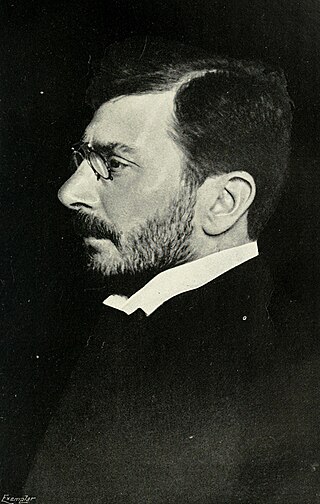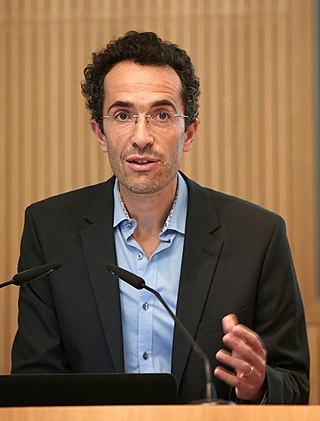
Ferdinand Brunetière was a French writer and critic.
The International Psychoanalytical Association (IPA) is an association including 12,000 psychoanalysts as members and works with 70 constituent organizations. It was founded in 1910 by Sigmund Freud, from an idea proposed by Sándor Ferenczi.

Rudolph Maurice Loewenstein was an American psychoanalyst who practiced in Germany, France, and the United States.

Élisabeth Roudinesco is a French scholar, historian and psychoanalyst, affiliated researcher in history at E.N.S.- P.S.L ; University of Paris, in the group « Identités-Cultures-Territoires ».
The non-conformists of the 1930s were groups and individuals during the inter-war period in France that were seeking new solutions to face the political, economical and social crisis. The name was coined in 1969 by the historian Jean-Louis Loubet del Bayle to describe a movement which revolved around Emmanuel Mounier's personalism. They attempted to find a "third (communitarian) alternative" between socialism and capitalism, and opposed both liberalism/parliamentarism/democracy and fascism.

Georges Devereux was a Hungarian-French ethnologist and psychoanalyst, often considered the founder of ethnopsychiatry.
L'Année philologique is an index to scholarly work in fields related to the language, literature, history and culture of ancient Greece and Rome. It is the standard bibliographical tool for research in classical studies. Published in print annually since 1928, with the first volume covering the years 1924–1926, it is now also available online by institutional or individual subscription. As of June 2014, the electronic version covers volume years 1924 through 2011. The editorial staff gathers each year's additions from 1,500 periodicals, with an additional 500 articles from collections.
Antoinette Fouque was a French psychoanalyst who was involved in the French women's liberation movement. She was the leader of one of the groups that originally formed the French Women's Liberation (MLF), and she later registered the trademark MLF specifically under her name. She helped found the publishing house Éditions des Femmes as well as the first collection of audio-books in France, "Bibliothèque des voix". Her position in feminist theory was primarily essentialist, and heavily based in psychoanalysis. She helped author Le Dictionnaire universel des créatrices (2013), a biographical dictionary about creative women.
In the psychoanalysis of Sigmund Freud, afterwardsness is a "mode of belated understanding or retroactive attribution of sexual or traumatic meaning to earlier events... [from the German word] Nachträglichkeit, translated as deferred action, retroaction, après-coup, afterwardsness". As summarized by another scholar, 'In one sense, Freud's theory of deferred action can be simply stated: memory is reprinted, so to speak, in accordance with later experience'.
Mikkel Borch-Jacobsen is a professor of Comparative Literature and French at the University of Washington in Seattle, and the author of many works on the history and philosophy of psychiatry, psychoanalysis and hypnosis. Born to Danish parents, he began his studies in France and emigrated to the United States in 1986. His constructivist analysis of the co-production of psychical "facts" emphasises the accuracy of historical accounts of mental disorders.
The Paris Psychoanalytical Society (SPP) is the oldest psychoanalytical organisation in France. Founded with Freud’s endorsement in 1926, the S.P.P. is a component member of the International Psychoanalytical Association (I.P.A.) as well as of the European Psychoanalytical Federation (E.P.F.).
John Forrester was a British historian and philosopher of science and medicine. His main interests were in the history of the human sciences, in particular psychoanalysis and psychiatry.
Georges Heuyer was a physician and child psychiatrist in France, who was appointed to the first chair of child psychiatry in Europe.

François Crouzet was a French historian. Considered the greatest French historian of Britain of his generation, he was Professor Emeritus of Modern History at the Université de Paris-Sorbonne at the time of his death.

Anne-Lise Stern was a French psychoanalyst and Holocaust survivor.

Amy Dahan-Dalmédico is a French mathematician, historian of mathematics, and historian of the politics of climate change.
The Second French Statute on the Status of Jews, of 2 June 1941, was an anti-semitic law enacted under Vichy France and signed into law by the Head of the French State, Marshal Philippe Pétain. It replaced the first Law on the status of Jews of 3 October 1940. It included an increasingly stringent definition of who was a Jew in France. It specified a legal definition, of the term Jewish race, broadening its criteria for inclusion and extending the scope of the existing professional prohibitions. From that point on, Jews in France became second-class citizens, while they had since 21 September 1791 been full citizens.

Jérôme Segal is a French-Austrian essayist and historian, lecturer at Sorbonne University and a researcher and journalist in Vienna. He is also known for his contributions in the field of animal law. He is the author of several articles and books, in particular on Jewishness and animal advocacy.

The Law of 3 October 1940 on the status of Jews was a law enacted by Vichy France. It provided a legal definition of the expression Jewish race, which was used during the Nazi occupation for the implementation of Vichy's ideological policy of "National Revolution" comprising corporatist and antisemitic racial policies. It also listed the occupations forbidden to Jews meeting the definition. The law was signed by Marshall Philippe Pétain and the main members of his government.
The Law of 4 October 1940 regarding foreign nationals of the Jewish race was a law enacted by the Vichy regime, which authorized and organized the internment of foreign Jews and marked the beginning of the policy of collaboration of the Vichy regime with Nazi Germany's plans for the extermination of the Jews of Europe. This law was published in the Journal officiel de la République française on 18 October 1940.









